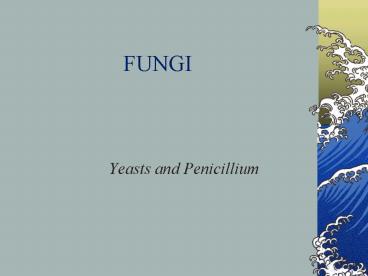FUNGI - PowerPoint PPT Presentation
1 / 17
Title:
FUNGI
Description:
The typical fungus is not made of cells but of tiny branching threads ... This means that the hyphae are septate (in Penicillium yeast don't have hyphae ... – PowerPoint PPT presentation
Number of Views:126
Avg rating:3.0/5.0
Title: FUNGI
1
FUNGI
- Yeasts and Penicillium
2
FUNGI
- Fungi are classified as a separate kingdom
- The typical fungus is not made of cells but of
tiny branching threads called hyphae - Yeasts are not typical fungi!
3
FUNGI
- The mass of hyphae that makes up one individual
fungus is called its mycelium - The hyphae are bounded by a plasma membrane and
have a cell wall. - In higher fungi the main component of the cell
wall is chitin
4
FUNGI
- Fungi are eukaryotic organisms (unlike bacteria)
- They never contain chloroplasts
- All are heterotrophic most a saprophytic a few
are parasitic
5
FUNGI
- Saprophytic fungi are of enormous ecological
importance. - Unlike most bacteria they can produce cellulases
and lignases - They can also taste exceptionally good!
6
(No Transcript)
7
FUNGI
- Penicillium and yeasts are classed as higher
fungi - This means that the hyphae are septate (in
Penicillium yeast dont have hyphae having a
cellular structure)
8
FUNGI
- Penicillium is a fungus with many useful enzymes
at its disposal to attack a host of organic
foodstuffs. . - It is partial to bread, cheese, cold meats, old
sandwiches, cereal products and a host of other
things.
9
FUNGI
- Penicillium roquefortii used in the manufacture
of blue cheese. - The blue in the blue-cheese is caused by the
pigment in the spores (conidia) of the fungus.
You are consuming spores by the million when you
eat blue cheese. Hope it doesn't put you off! - Penicillium notatum and P. chrysogenum are used
in the production of the antibiotic penicillin.
10
FUNGI
- Penicillium has feeding hyphae, which divide into
branches through its substrate. - It also has aeriel hyphae called condiophores
which branch to form sterigma.
11
FUNGI
- Cytoplasm oozes from the tips of the sterigma
- This hardens to form chains of green-grey
condiospores. - These are dispersed by air currents and can each
germinate to form a hypha on a suitable medium.
12
Penicillium notatum
13
FUNGI
- YEAST
- Saccharomyces cerevisiae used in bread making
- Saccharomyces ellipsoideus used in wine making
- Saccharomyces carlsbergensis used in lager
making - Differ form each other by only one gene
14
FUNGI
- YEAST
- Ellipsoid in shape
- Permeable cell wall composed of mannose and
glucose polymers - Full range of eukaryotic organelles
15
FUNGI
- YEAST
- One or more large vacuoles occupy a central
position in the cell - Storage materials such as glycogen and oil
globules are often present in the cytoplasm
16
(No Transcript)
17
FUNGI
- Yeast
- Under conditions unfavourable for growth the
yeast can undergo meiosis and produce haploid
spores that act like gametes - They usually reproduce asexually by budding































